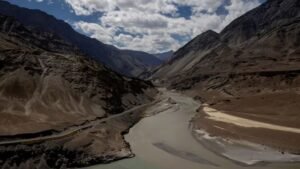A report from the Pakistani government shows a 13.3 percent annual decrease in water extracted from the Indus River System – which is provided to farms in Punjab province that are already facing water scarcity – after India suspended a 1960 water-sharing agreement due to the Pahalgam terror attack.
The Indus River System Authority of Pakistan reported that 124,500 cusecs were released from the Indus basin to reservoirs on June 5, in contrast to about 144,000 cusecs during the same period last year.
Experts stated that the deficit will impact the sowing of Kharif, or monsoon, crops. Monsoon rains might enhance this supply; however, until that time, crops in Punjab province of Pakistan are at risk.
“In Pakistan, reduced water levels in rivers and reservoirs tied to the Indus River System have led to a crisis for farmers. The planting of Kharif crops is currently in progress in Pak,” AK Bajaj, former Chairman of the Central Water Commission, informed NDTV.
ALSO READ: Bengaluru Stampede: Event firm DNA denies inviting people to Victory Event
Pak wrote 4 letters to reinstate IWT
As per sources, Pakistan, currently experiencing a significant water crisis, has wrote to India four times, requesting the reinstatement of the Indus Waters Treaty that was put on hold after the Pahalgam terror attack on April 22.
Sources indicate that the Jal Shakti Ministry has forwarded all four letters from Pakistan to the Ministry of External Affairs.

Sources indicated that Pakistan had also asked the World Bank, which facilitated the agreement, to intervene in the situation. Nevertheless, they stated that the World Bank declined to get involved in the matter.
In the four letters sent from Pakistan’s Ministry of Water Resources, Secretary Syed Ali Murtaza urged India to rethink its decision to halt the Indus Waters Treaty in May prior to Operation Sindoor. Subsequently, the ministry sent three additional letters to New Delhi, requesting the reinstatement of the agreement.
The Indus Waters Treaty
The Ravi, Jhelum, and Indus rivers primarily supply the Indus basin, all of which were designated to Pakistan in the Indus Waters Treaty but pass through India before crossing over.
The accord grants India control over the eastern rivers – namely, the Sutlej, Beas, and Chenab.
It also grants India the right to utilize certain waters from the western rivers designated for Pakistan, provided that its use does not substantially impact the volume of water flowing into Pakistan.
By suspending the treaty in response to the Pahalgam incident that resulted in 26 fatalities, Delhi has managed to regulate, to a degree, the western rivers and the water supply to Pakistan.














